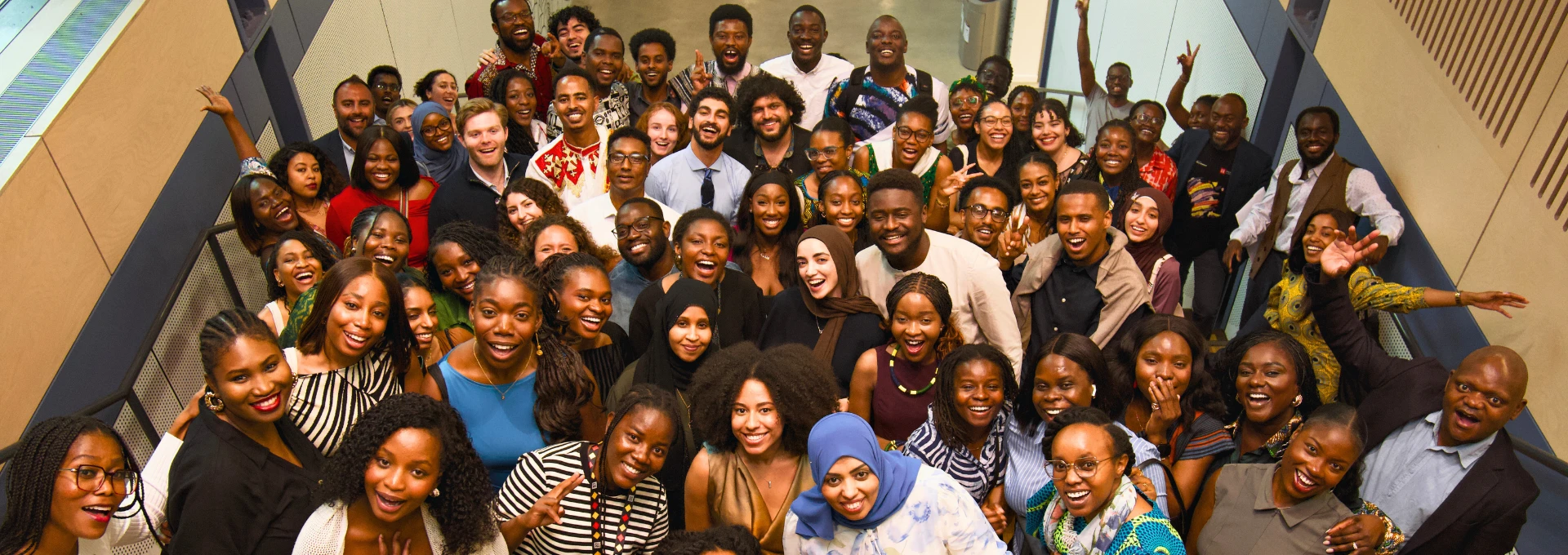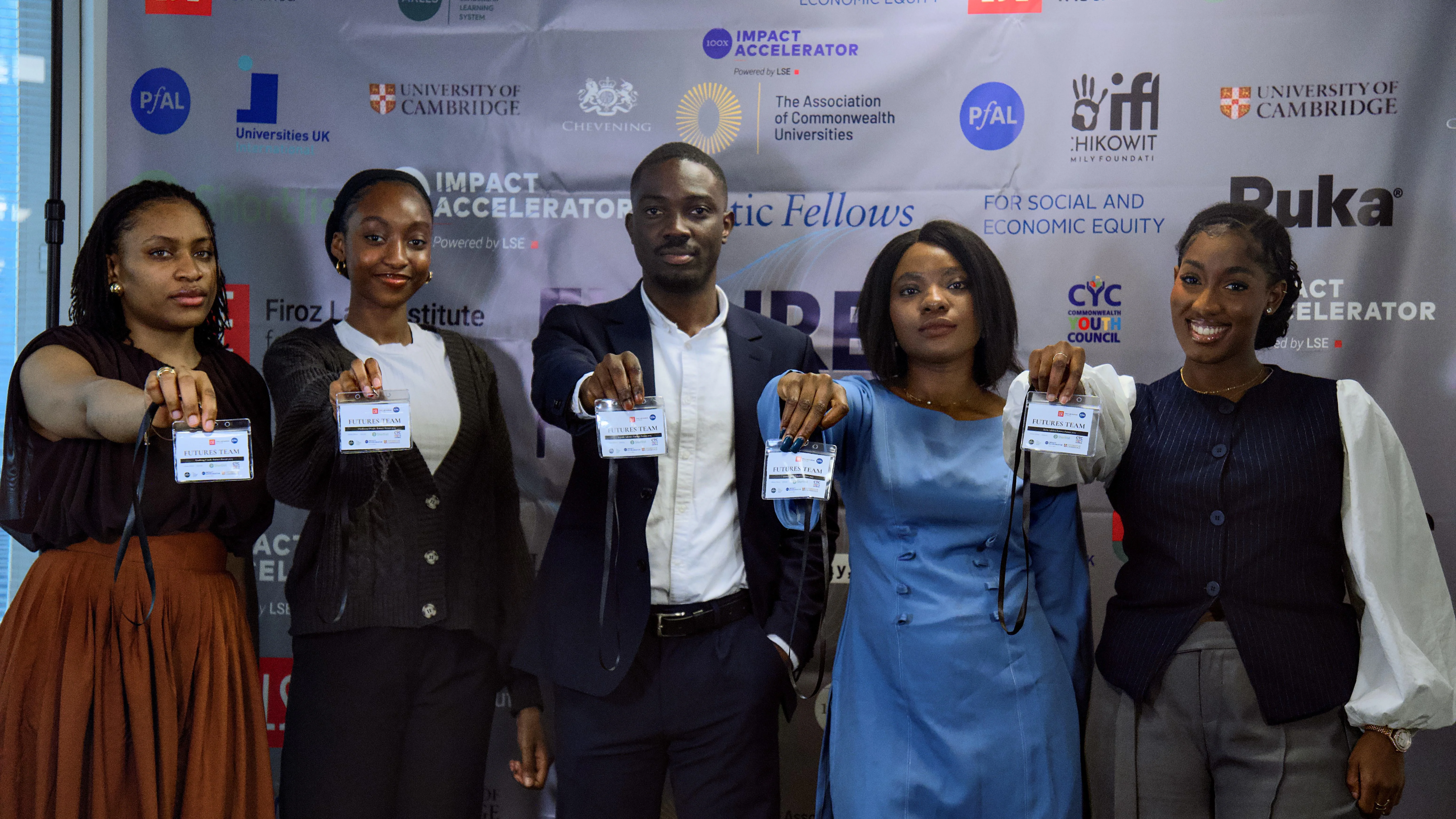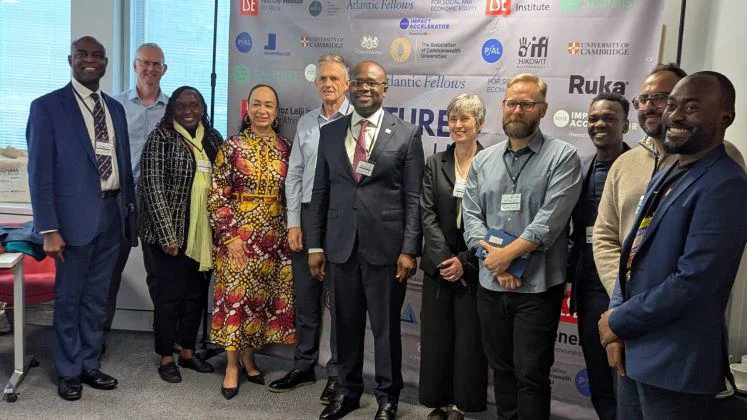Futures Forum

Futures Forum
FLIA has launched the Futures Forum a new PfAL initiative addressing innovation, leadership and sustainable futures.

The Futures Forum 2025 Team: Enobong Umoh, Onehizena Oviojie, Kayode Adeniyi, Zainab Sanni, Fatima Kane.
The LSE Futures Forum brings together scholars, researchers, and professionals to "co-create new pathways for collaboration" in response to challenges such as sustainability and artificial intelligence that define our contemporary world and to generate African-led solutions to continental challenges.
The 2025 event produced a white paper following the discussions. The document addresses the systemic barriers that constrain Africa's potential while leveraging existing strengths and emerging opportunities. It contains frameworks that reflect the Forum's emphasis on industry-led responses to challenges in Education, Sustainability, Development and Innovation, offering concrete pathways from current constraints to measurable transformation.
- DownloadFutures Forum White Paper 2025pdf(5.41MB)
Futures Forum White Paper 2025
Professor Emma McCoy Vice President and Pro-Vice Chancellor of Education at LSE described the event as reflective of LSE’s approach to evolving with the world around us by “empowering students for the global community through inclusive but forthright education”.
“Having this event today, which brings together six of LSE's leadership programmes and other UK-based fellowships, in addition to scholars, researchers, academia and professionals to co-create new pathways for collaboration, is a fitting response to challenges such as sustainability and of course, artificial intelligence that we face in today's world,” she said.
Also speaking at the event, Ghana’s Minister for Defence, Dr Edward Omane Boamah spotlighted the need for Africans to take ownership of solutions to challenges in the region. Boamah noted, “We can achieve a lot if we unlock servant-leaders ready to develop the continent, and people, and businesses who choose an ethical approach while eschewing corruption.”
The event which featured a collaborative Learning Lab to develop industry-led responses to challenges in Education, Sustainability, Development and Innovation had in attendance participants from the University of Cambridge, Atlantic Fellows for Social and Economic Equity, Commonwealth Youth Council, Africa Business Club, Ashinaga Scholars, Chevening Fellowship amongst others.
Chief Global Affairs Officer of Times Higher Education (THE), Phil Baty who contributed to the panel session on Forging a Shared Drive for Workforce and Sustainable Futures, sponsored by Shortlist Futures spoke about THE’s numerous initiatives. He noted that THE’s new platform, International Green Learning and Skills Accelerator, focuses on empowering graduates to prepare for a net-zero economy.

“Our impact ranking shakes up traditional perspectives of excellence in global higher education and could be deployed to support more equitable north-south research collaboration and student exchange,” Phil said. Dr Kerryn Krige, Senior Lecturer of Philanthropy and Social Entrepreneurship at LSE’s Marshall Institute also joined a panel session on Innovation Beyond Cultures: Connecting Changemakers to Solve Systemic Problems Through Cross-Collaborations sponsored by the institute’s 100X Impact Accelerator while the panel on Education for Impact: Fostering Development Through Collaborative Policy Interventions, sponsored by the Atlantic Fellows for Social and Economic Equity (AFSEE) was chaired by AFSEE’s Associate Professor (Education) and Lifelong Engagement Lead, Dr George Kunnath.
A key highlight of the event was The Fireside Chat which featured Ajay Sood, Founder of All Round Leadership Learning Systems (ARLLS); Nike De Souza, Founder of Teach for Nigeria; and Harry Barkema, Professor of Strategy, Social Innovation, and Entrepreneurship at LSE. They shared insightful leadership and career experiences with the audience. Sood noted that there was a need for value-driven leadership and spoke extensively about how the ARLLS model that emphasises experiential learning.
Meanwhile, Deputy Governor of The Central Bank of Uganda, Professor Augustus Nuwagaba said there was a need to broaden access to financing social enterprises, especially people from underserved communities across. During his remarks, he stressed that “there was a need for multilateral institutions to play a concerted role in ensuring shared growth and transformative leadership grounded in mindset change and strategic collaboration.”
Senior Programme Manager at Firoz Lalji Institute for Africa, Tosin Adebisi said that Futures Forum stands out for its collaborative and action-oriented elements, noting that the event had now given rise to Futures Network- a community of inter-generational leaders and, made up of young leaders and scholars who will lead intersectional policy and project interventions to global development challenges.
For more information, please contact Tosin at o.adebisi@lse.ac.uk